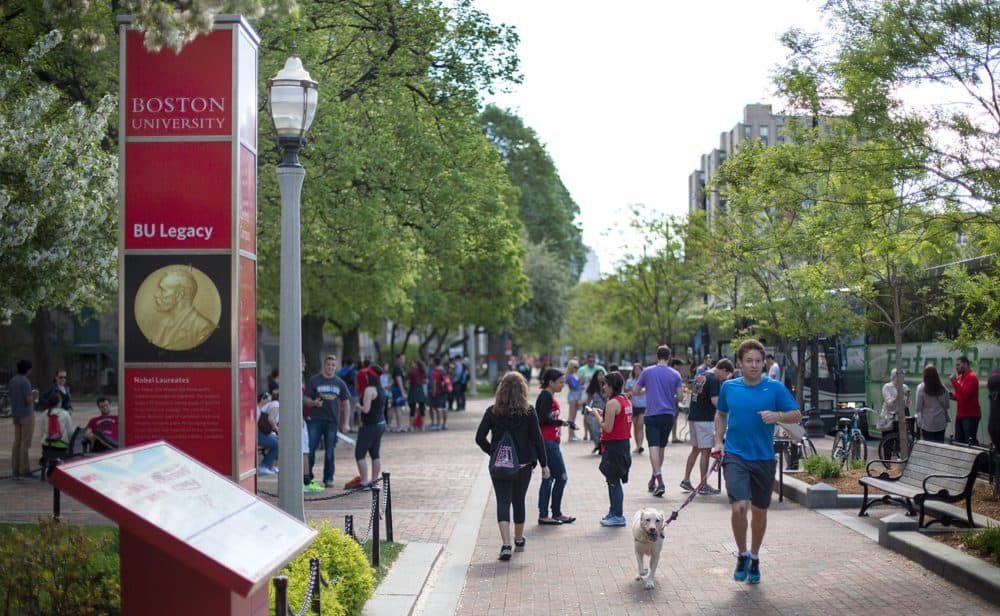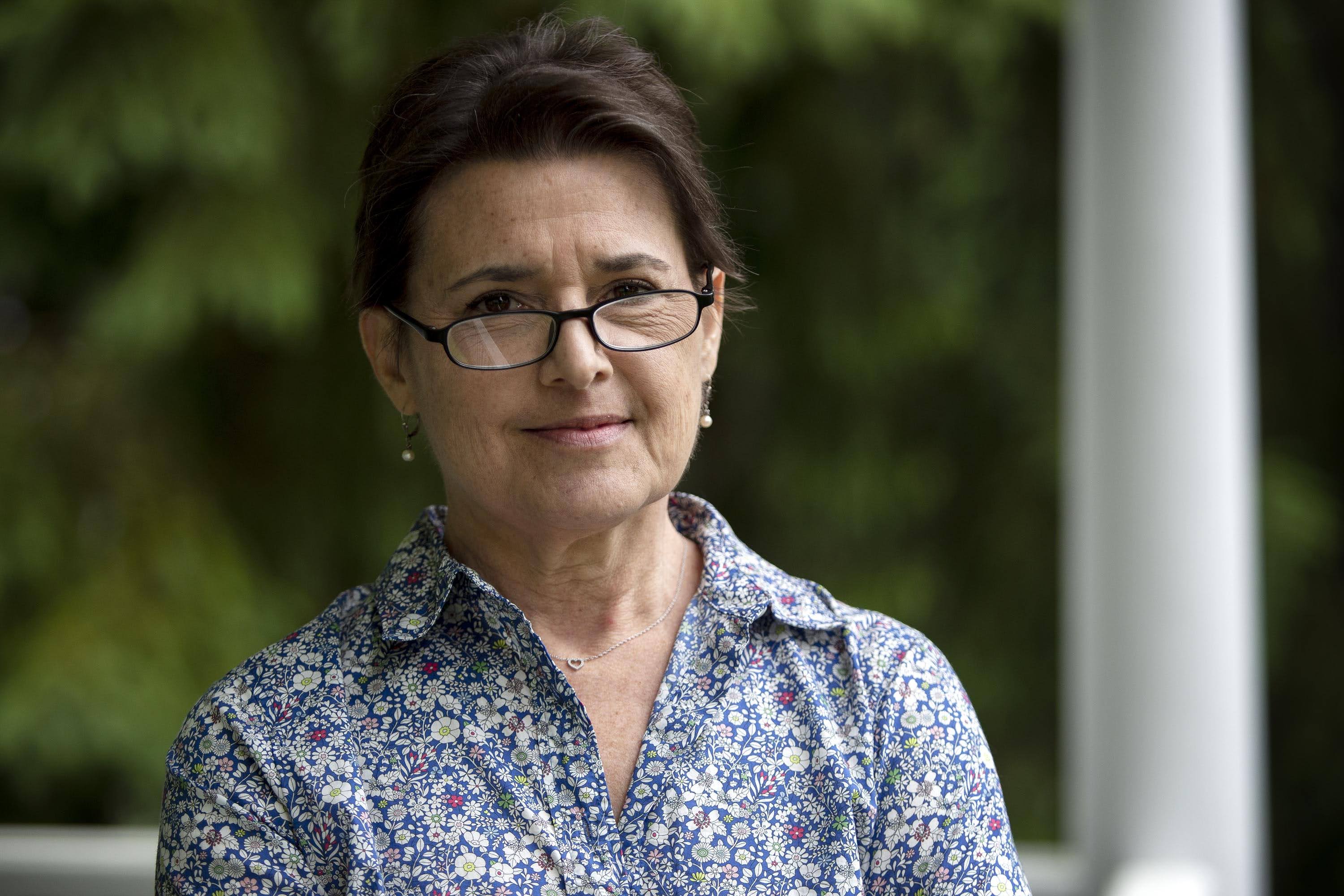Advertisement
Asked To Return To Campus, College Faculty Brace For A Pandemic Fall

At Boston University, the developing plans for on-campus offerings this fall have prompted a revealing public controversy over health, safety and fair treatment during the ongoing coronavirus pandemic.
In conversations with WBUR, teachers and staff at Boston University tended to applaud the administration for respecting students' diverse wishes and needs in their planning. But many are angry. Even with personal protective equipment promised, some are dreading a return to academic life on the global campus.
Under Boston University's emergent plan for fall — stylized as "Learn from Anywhere" — students get a choice: come to campus for a blend of in-person and remote learning, or stay at home and learn entirely online.
On the university's Reddit page, some students rejoiced after the plan was announced in early June. One commenter called it "the best possible solution." If applied, it represents an early chance at a return to something like normalcy on the Commonwealth Avenue campus — after students had to leave dorms and classrooms quickly as the outbreak worsened in mid-March.
"As a faculty member who loves my job and loves my students, I'm not seeing my concerns — and those of my colleagues — captured."
Melanie Smith, senior lecturer in BU's writing programs, on concerns about faculty health and safety in the university's plans for fall.
Faculty aren't as enthused.
"As a faculty member who loves my job and loves my students, I'm not seeing my concerns — and those of my colleagues — captured" in the plan, said Melanie Smith.
Smith has taught writing at BU for the past 12 years. Still, under normal circumstances, she looks forward to each fall with some eagerness. "There’s this newness, with students being on campus for the first time," Smith said. "The air sort of crackles with excitement."
But this fall is different; the crackle comes with an edge of fear. In the absence of official confirmation, Smith fears that she and her colleagues in the writing program will be back in their typical basement classrooms on Cummington Mall.
"Under normal circumstances, it’s an inhospitable environment," Smith said. “There’s barely any room to move. I would guess when I’m standing at the desk, the student nearest to me is three feet away. Right in front of me."
Advertisement
Smith is 58, with both asthma and an underlying health condition she did not disclose. It makes her particularly anxious about returning to poorly-ventilated classrooms just as coronavirus risks may mount in Boston.

And Smith is not alone in raising alarms with administrators and asking for consideration.
On May 25, a group of faculty in BU's writing program wrote a letter to deans asking that faculty members find out about workplace changes before they're announced publicly — and that any teacher concerned about being physically present this fall be allowed to work remotely. They haven't yet received a satisfactory reply.
And in the weeks since, two tenured professors of philosophy have taken a more public-facing approach.
In an open letter published on June 2, Russell Powell and Daniel Star described any "blanket obligation" for faculty to return to classrooms as an "unconscionable breach" of the university’s moral duties. Among other faculty, they have interpreted internal communications received this week from BU's provost as warning that wholesale exceptions to a program of in-person teaching will be rare.
"Russell and I have worried about ‘democracy theater’, apparent democracy but not real democracy," Star said. "The emails we receive internally from BU leadership are basically focusing just on the interest of students at this time, and there has been not a single general email from university leadership that addresses the concerns that faculty all share to do with our own well-being."
In a statement, a spokesperson for BU said the university has "not yet made any final decisions about faculty returning to the classroom," and that the safety of faculty is being considered. The statement goes on to say that "we must continue to be aware of our students’ needs, including their desire to return to a residential educational experience this fall."
Powell asked for hard evidence of that claim, saying that in his own conversations, students show concern for faculty, rather than a heedless desire to return to campus at all costs.
"They’re all incredibly thoughtful," he said. In part because they're young, Powell went on, "a lot of them haven’t thought through the full ramifications of what it would mean to teach in person during the pandemic — what that would mean."
Powell and Star are still pushing. On Wednesday, they launched a petition that asks that all BU teaching staff be given the opportunity to work off-campus this fall, with no questions asked. At the time of publication, around 500 people had signed it — among them dozens of students.
But the risks of an enrollment dip related to online learning are real enough to take seriously.
Last year, BU took in more than $1 billion in tuition and fees, accounting for more than half of its overall revenue. Given that fact, it's unclear whether students are best regarded as members of an academic community — Powell's view — or as high-paying customers then putting their needs first makes more financial sense.
"Online learning is very regimented. You can add all of the resources you want to — the product is really not the same."
BU undergraduate Neil Bedi
And there is some evidence that in-person learning is what students want. "There is a reason we have college campuses, right?," said undergraduate Neil Bedi. "There's a certain experience of walking into your professor's office... and having a conversation with them."
Bedi just finished his second year in BU's fast-track program in the medical sciences. While Powell said he'd be happy sticking with remote education for the duration of the pandemic, Bedi is more ambivalent.
"Online learning is very regimented," he said. "You can add all of the resources you want to — the product is really not the same."
As a consumer, Bedi thinks online learning should be discounted — something the university isn't likely to offer.
And yet for now, the aspiring doctor in Bedi is winning out. He's leaning toward staying with family in the San Francisco Bay Area this fall — not just for himself, but to de-densify campus for those who absolutely have to be there, both staff and students.
"Me staying home is a sort of benefit for them. Because it's making campus safer for them and everyone else," Bedi said.
Rising senior Holly Warner is one of those people. She's a first-generation college student whose family still live in rural Ohio. She works to cover her own living expenses.
If some classmates worried about staying on campus as the outbreak worsened this spring, Warner said, she feared having to leave: "There's no way to sustain myself at home. My wages are lower at home. There's no jobs at home. My parents can’t have a third person in the house."
Warner did get permission to remain on campus during the closure — only to contract COVID-19, she believes, when working her food-service job on campus.
She said she lost her sense of taste and smell for days on end, and went into a self-imposed quarantine — all while contemplating her choices: did she get sick because she made coffee for the wrong customer? "Like, what are we doing? Why am I putting myself at risk for this? And it's because I have to!"
If anything, Warner says, it makes her empathize all the more with adjunct and part-time teachers, now weighing the same risks come fall.
At home in Andover, Melanie Smith is contemplative, too. If BU doesn't budge, she figures, she might have to: "Certainly if I’m gonna weigh the risk of exposure vs. the benefit of having a job, I think in my case, really, I have to put my health front and center."
So while some of her colleagues plan to keep pushing, Smith said her summer plan is to try to unplug. Her classes in the fall have already filled up.
Editor's note: Boston University owns the broadcast license for WBUR.
